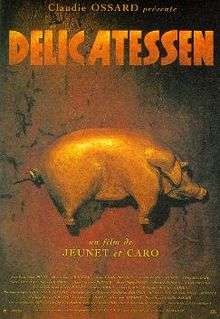Delicatessen (film)
| Delicatessen | |
|---|---|
 Original theatrical poster | |
| Directed by |
Marc Caro Jean-Pierre Jeunet |
| Produced by | Claudie Ossard |
| Written by |
Gilles Adrien Marc Caro Jean-Pierre Jeunet |
| Starring |
|
| Music by | Carlos d'Alessio |
| Cinematography | Darius Khondji |
| Edited by | Hervé Schneid |
Production company |
|
| Distributed by | Miramax |
Release dates |
France: 17 April 1991 United States: 3 April 1992 |
Running time | 99 minutes |
| Country | France |
| Language | French |
| Budget | $3.8 million |
| Box office | $12.4 million[1] |
Delicatessen is a French 1991 post-apocalyptic black comedy film directed by Jean-Pierre Jeunet and Marc Caro, starring Dominique Pinon and Karin Viard. It was released in North America as "presented by Terry Gilliam." Like its successor, The City of Lost Children (1995), it was an homage to the works of Gilliam.[2]
Plot
In a dilapidated apartment building in post-apocalyptic France, food is in short supply and grain is used as currency. On the ground floor is a butcher's shop, run by the landlord, Clapet (Jean-Claude Dreyfus), who posts job opportunities in the Hard Times paper as means to lure victims to the building, whom he murders and butchers as a cheap source of meat to sell to his tenants.
Following the "departure" of the last worker, unemployed circus clown Louison (Dominique Pinon) applies for the vacant position. During his routine maintenance, he befriends Clapet's daughter, Julie (Marie-Laure Dougnac), a relationship which slowly blossoms into romance. Louison proves to be a superb worker with a spectacular trick knife and the butcher is reluctant to off him too quickly. During this time several of the tenants fall under Louison's boyish charms, worrying others who are more anxious for their own safety should they require meat. Aware of her father's motives, Julie descends into the sewers to make contact with the feared Troglodistes, a vegetarian sub-group of French rebels, whom she persuades to help rescue Louison.
During the apparent butchering of an old woman, the Troglodistes attack but are repelled, and Clapet, with the unsympathetic tenants, storms Louison's room in an attempt to murder him. Louison and Julie resist by flooding themselves, floor to ceiling, in an upper floor bathroom until Clapet opens the door releasing the flood and washing the attackers away. Clapet returns with Louison's knife and inadvertently kills himself. Louison and Julie play music together on the roof of the now peaceful apartment building.
Cast
- Dominique Pinon as Louison
- Marie-Laure Dougnac as Julie Clapet
- Jean-Claude Dreyfus as Clapet
- Karin Viard as Mademoiselle Plusse
- Ticky Holgado as Marcel Tapioca
- Edith Ker as Grandmother
- Rufus as Robert Kube
- Jacques Mathou as Roger
- Howard Vernon as Frog Man
- Marc Caro as Fox
Marketing
The original American trailer for the film simply presented the comic "squeaky spring" sequence in full. The sequence depicts a montage of the butcher-landlord making love to his mistress on a noisy bed, while the rest of the building's tenants perform activities (painting ceilings, knitting, playing the cello, assembling animal calls) at an increasing pace, with the squeaks from the bedsprings dictating the tempo. The trailer ended with the butcher climaxing, each tenant's activity ending (rather violently) and then a sudden cut to the title logo and the 'swinging pig' emblem from the film's opening credits.
On the UK Region 2 DVD released by Momentum Pictures, the soundtrack is available in four languages. These are French, German, Spanish and Italian.
Critical reception
The film was received well critically. The review aggregator Rotten Tomatoes gave it 88% from a total of 41 reviews,[3] and that of Metacritic gave it 66 out of 100 out of a total of 17 reviews.[4] Variety called it "a zany little film that's a startling and clever debut",[5] while Empire called it "[a] fair bet for cultdom, a lot more likeable than its subject matter suggests, and simply essential viewing for vegetarians".[6] Not all reviews were positive, however, with The New York Times saying "its last half-hour is devoted chiefly to letting the characters wreck the sets, and quite literally becomes a washout when the bathtub overflows."[7]
Awards and nominations
The film has won and been nominated for several important European awards. At the César Awards it won Best Editing, Best Debut, Best Production Design and Best Writing, at the European Film Awards it won Best Set Design, at Fantasporto the Audience Jury Award, at the Guild of German Art House Cinemas Best Foreign Film, at Sitges Best Actor, Best Director, Best Original Soundtrack and the Prize of Catalan Screenwriter's Critic and Writer's Association. At the Tokyo International Film Festival, it won the Gold Award.[8] The film was nominated for the Grand Prix of the Belgian Syndicate of Cinema Critics. It also received nominations for those award ceremonies as well as for the BAFTAs.
References
- ↑ "Delicatessen (1991)". JPBox-Office. 1991-04-17. Retrieved 2016-11-27.
- ↑ Clark, Mike (May 5, 2006). "New on DVD". USA Today. Retrieved November 27, 2016.
- ↑ "Delicatessen (1991)". Rotten Tomatoes. Retrieved 14 December 2012.
- ↑ "Delicatessen Reviews". Metacritic. Retrieved 31 August 2009.
- ↑ "Delicatessen Review". Variety. 1 January 1991. Archived from the original on 31 August 2009. Retrieved 31 August 2009.
- ↑ Yeovil, Jack. "Delicatessen Review". Empire. Retrieved 31 August 2009.
- ↑ Maslin, Janet (5 October 1991). "Delicatessen (1991)". The New York Times. Retrieved 31 August 2009.
- ↑ "Awards for Delicatessen". Internet Movie Database. Retrieved 31 August 2009.